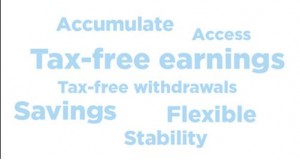In a C.D. Howe Institute e-brief released January 27, 2010, the writers claim that TFSA’s may be “a more tax efficient retirement saving vehicle than traditional tax-deferred accounts.”
Let’s take a look at the characteristics of both the RRSP and the TFSA and determine which is the better vehicle for saving, more particularly retirement saving. While the TFSA is considered to have greater flexibility, it is the different tax treatment of each plan that must be the main focus of comparison.
Regulations that characterize a RRSP
1. You must have an earned income to “build room” in order to be able to contribute.
2. Once RRSP “room” is used, it is not recoverable.
3. You need not contribute every year but can accumulate room.
4. The RRSP deposited in any year is deducted from that year’s income, thus providing a refund at your marginal tax rate.
5. All money within a RRSP is taxable when withdrawn, deposits plus earnings.
6. At age 71, a RRSP must be converted to a RRIF, which will require minimum annual withdrawals.
7. RRSP and RRIF income are used in calculating the Old Age Security claw back.
Regulations that characterize a TFSA
1. You do not require earned income to “build room.” The annual limit has been set at $5000 for everyone 18 or over (indexed to inflation and rounded to the nearest $500).
2. You need not contribute every year but can accumulate room.
3. Once you reach your contribution limit, you must wait until the next calendar year to make a further $5000 deposit.
4. All withdrawals from a TFSA are added to the following year’s maximum limit.
5. Deposits are not tax deductible.
6. None of the money within a TFSA is taxable when withdrawn.
7. There is no requirement to convert to a RRIF or wind up the TFSA before death.
8. Since withdrawals are not taken into income, they are not used in calculating the Old Age Security claw back.
A Simple Comparison of the tax effect on the RRSP and the TFSA
Let’s assume that you have $1,000 to put into your RRSP or your TFSA and your marginal tax bracket is 40% before and after retirement. You reinvest the tax refund and the investment makes 6%.
In year 1 you have $1400 in your RRSP and $1000 in your TFSA.
Using the Rule of 72, the RRSP balance is $2800 and the TFSA balance is $2000 in 12 years. Soon an after-tax basis you have $1680 with the RRSP and $2000 with the TFSA.
Keeping the above in mind, it is your personal situation that should guide you as to which vehicle is best for you.
Many people assume that their marginal tax bracket will be lower in retirement than during their working years. This is often not a safe assumption because it has been my experience that many people are often at the same marginal tax rate or higher after retirement. For those who are currently in a low tax bracket and expecting to move into a higher bracket in the next few years, a reasonable position would be to delay RRSP contributions. The TFSA would be a better choice.
If you are middle aged, a combination of RRSP and TFSA deposits would be most beneficial. Because the TFSA limits are currently small, the TFSA will not allow you to accumulate adequate savings for retirement. However, because the TFSA allows for more flexibility in estate and income planning in retirement, it is an important part of balanced planning. (Please refer to the post on Insured Annuities).
Younger people, who are planning big expenditures such as the purchase of a home or car, should use the TFSA for two very obvious reasons: none of the income is taxable and any withdrawals are added back to your permitted limit. As an example, let’s assume you purchased the TSX ETF inside your TFSA a year ago with $5000. Now you have decided to buy a car and you withdraw approximately $7500 (a 50% rise in the TSX). The $2500 capital gain is not taxed. The $7500 will be added to your 2011 TFSA limit for a total of $17500 (assuming you do not make a deposit in 2010).
In conclusion, maximize your TFSA contributions whenever possible.
What kind of investments do you put into your TFSA’s? Let me know in the comments.
Has this post provided you with any value? If so, please take a moment to share it via Twitter, Facebook and StumbleUpon.









